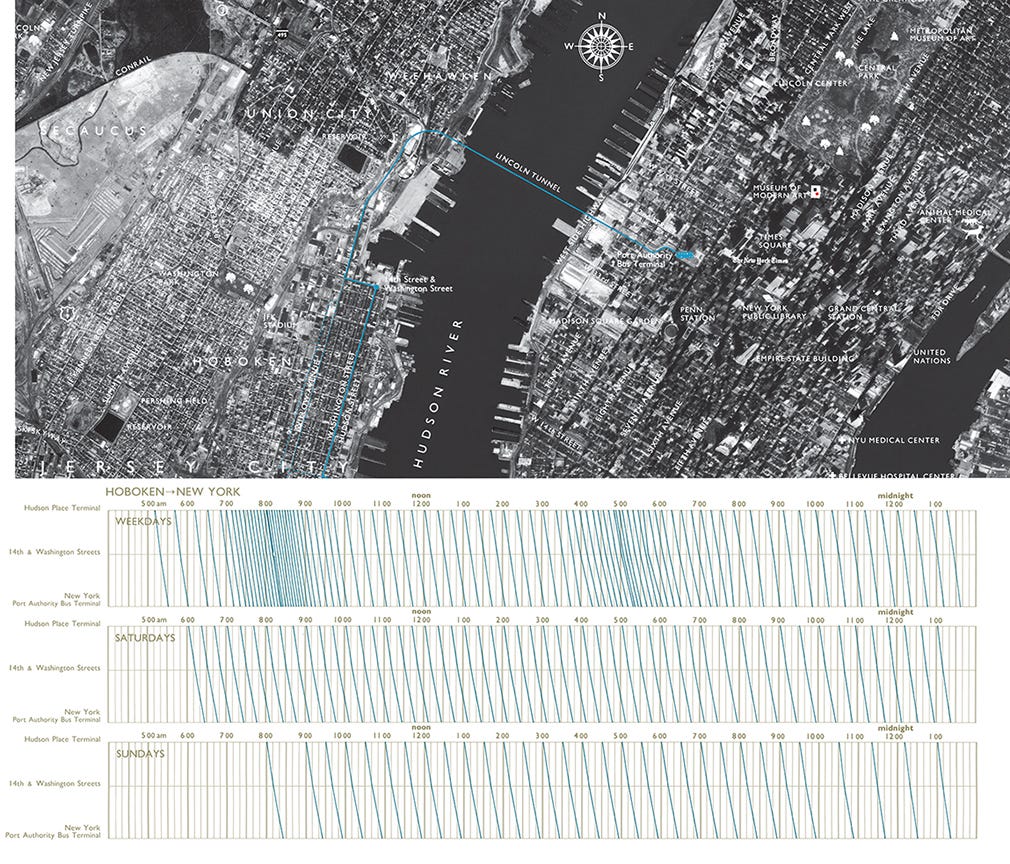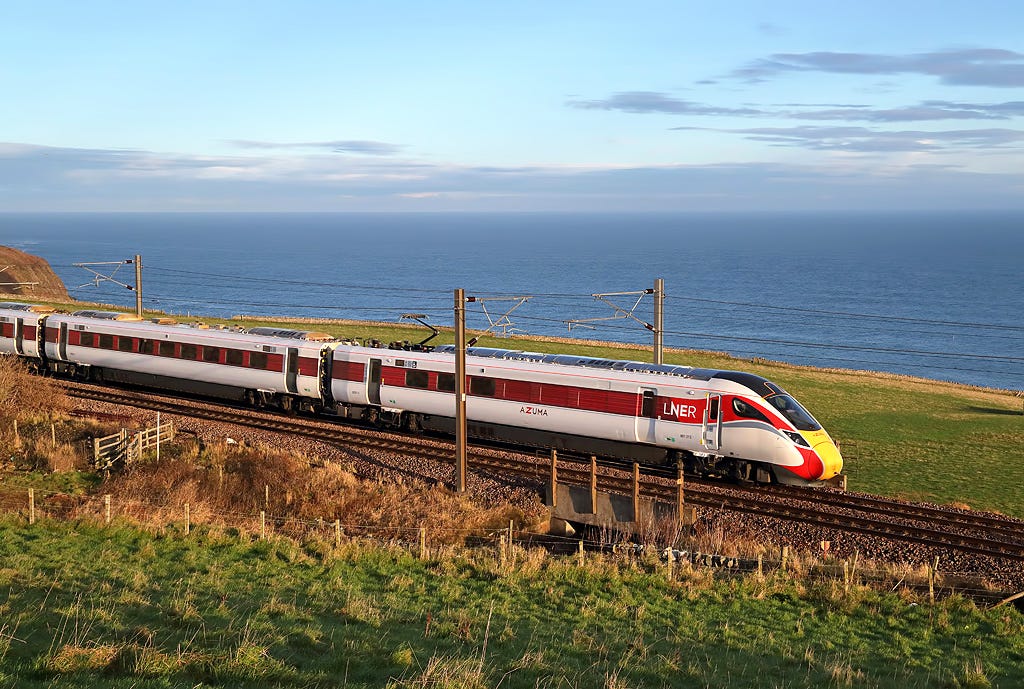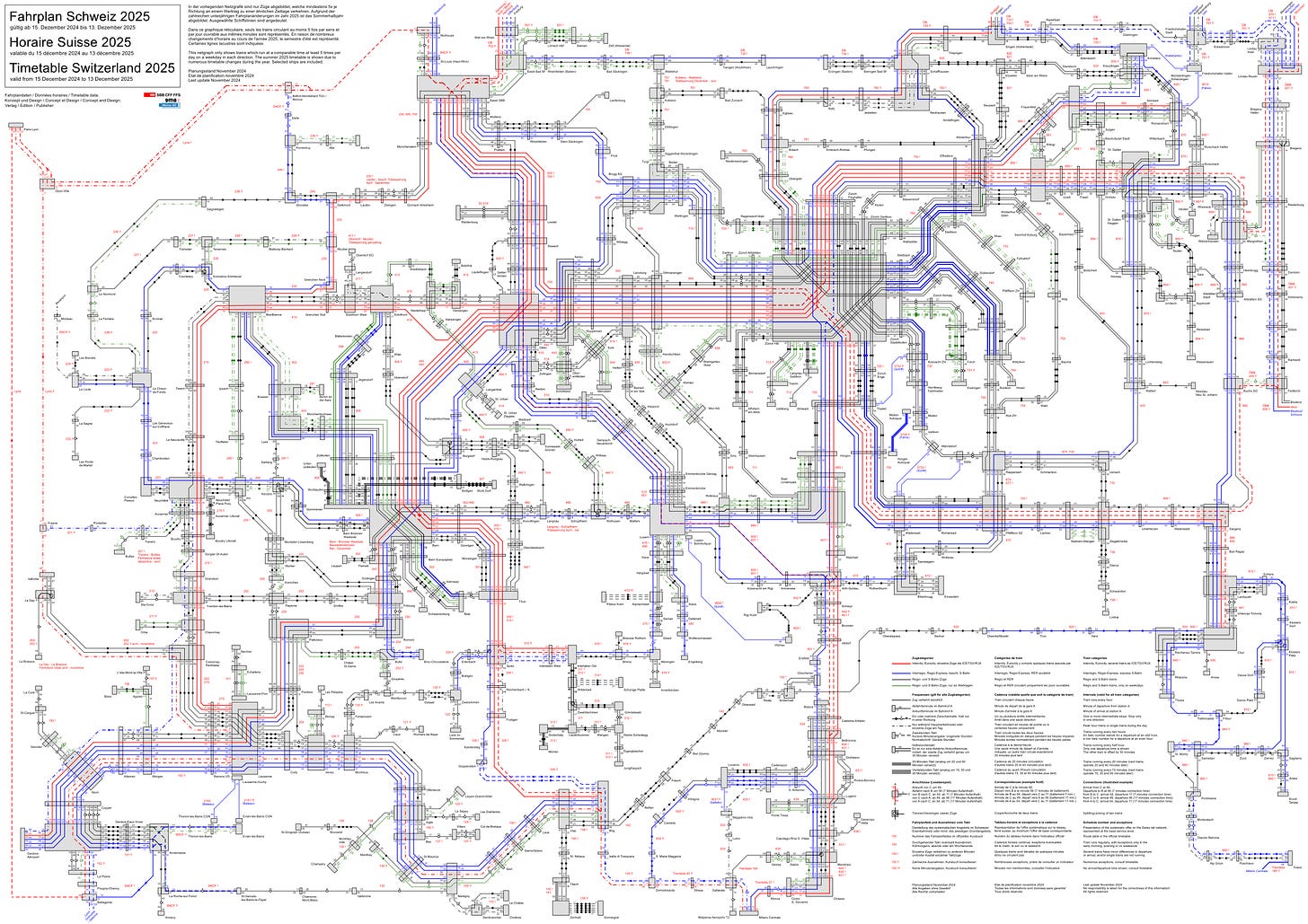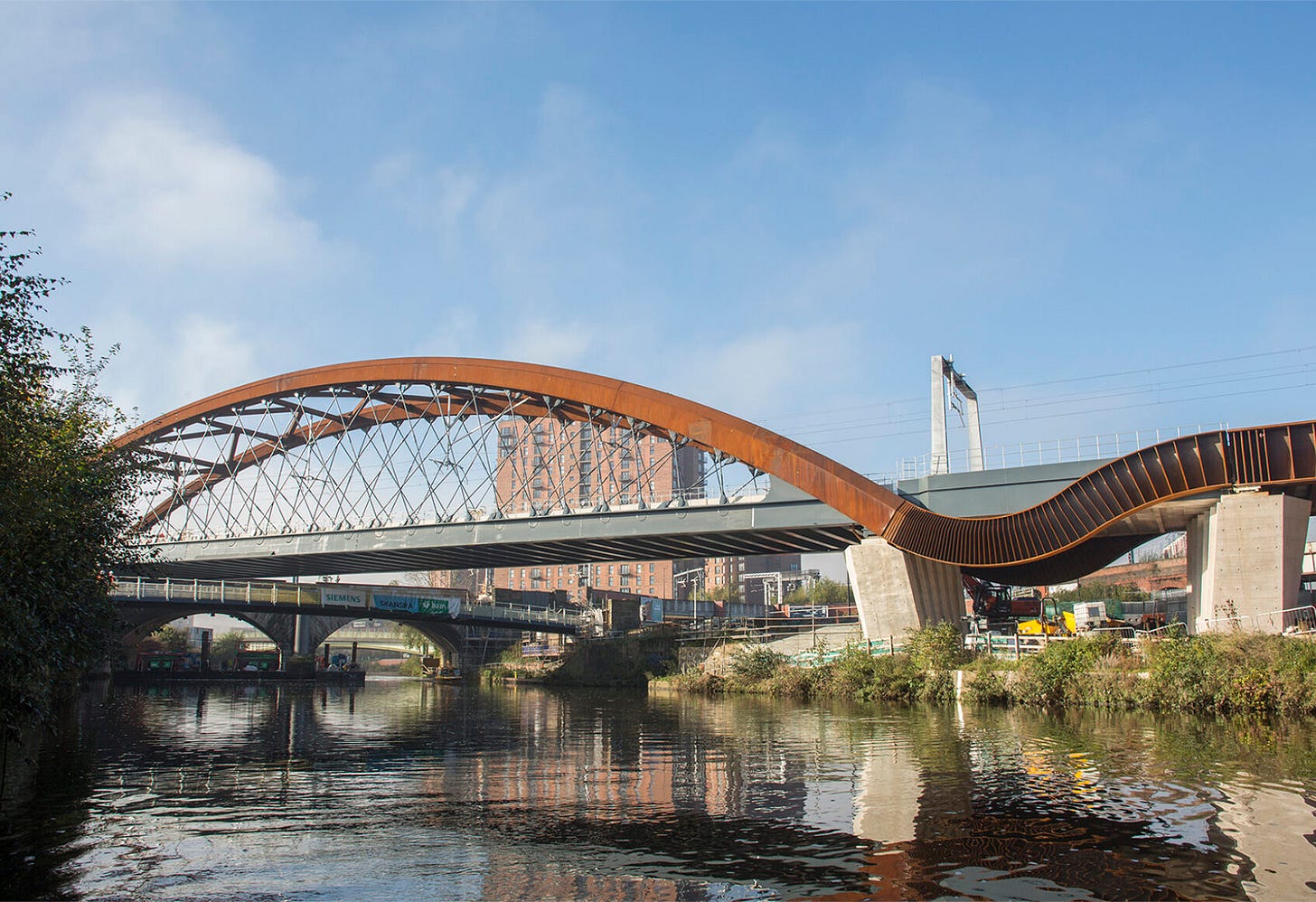The product of the railways is the timetable
A railway moves people around, not trains
This post is about a simple, yet crucial insight: the product of the railways is the timetable. Not the tracks, not the trains, but the timetable.
First ask yourself – What is the purpose of a railway? The job of the railways is to move people around. A person gets a train because they want to travel from A to B.
A small group of enthusiasts (me included) will actively choose to get the train if at all possible, but the vast majority of people are not particularly loyal to how their user need is met. They might drive, they might fly, they might cycle, they might decide not to make the journey and just do a video call. All of these things are the competitors of the railways.
We could therefore say that the product of the railways (and roads, and airports) is travel. But we can be more specific than that. A railway is not like a road. A road is built, and then it is open for anybody to use it at any time. There is no need to plan out precisely when cars move along the road. The movements of trains, by contrast, have to be planned out months in advance. It would neither be possible nor sensible to run trains ad hoc. They are not taxis, free to roam the roads whenever they like. Railway tracks are a network; everything depends on everything else. The service from Cambridge to Norwich affects the service from Norwich to London Liverpool Street, which in turn affects the service from Liverpool Street to Southend. To optimise the use of the tracks, train movements have to be planned out well in advance with precision.
This planning is what we call the timetable, the mapping between space and time that determines which train occupies which track at which time. The railways offer travel to the public via the timetable: a traveller buys the (supposed) fact that the 12.32 from Reigate gets into London Victoria at 13.19. The product of the railways is the timetable.

For this product to be something that people want to use, it has to be better than the competition. Seen from the perspective of the passenger, railways as a technology have two inherent advantages. They are quick, sometimes very quick, and they are very reliable.
The reliability point may seem risible, but it is true: the possibility of an hour’s delay is just accepted as a fact of life on a road trip or a flight, whereas with railways, we start tutting as soon as the train is merely five minutes late. We become irritated because we hold the railways to a high standard of reliability, and we hold them to that standard because they generally fulfil it.
(There are a few subsidiary advantages that railways have – you can work on a train, anybody can use them without a licence, they tend to be pretty comfortable, you can look at pretty views. Still, basically, people get the train because it’s quick and reliable.)

There are two main downsides for passengers. Railways are public transport, which means sharing space with strangers. Most people do not mind this in principle, but nobody likes having to stand on a crowded rush-hour train. And there is the ‘last mile problem’, the fact that trains often don’t get you precisely to where you want to go.
To hold their own against the competition, railways need to play to their strengths and minimise their weaknesses. This means that the timetable needs to provide trains that are fast. It must be able to run reliably. It should put on enough trains that crowding is minimised. And it has to run trains that go as near as possible to where people actually want to go. This is the fundamental business strategy of any railway.
One of these qualities is less obvious than it may seem, and that is speed. When we think of fast trains, we usually think of high-speed rail, which is a railway line optimised for trains that reach a high top speed.
But in fact this is the wrong way to think about speed. What matters is a passenger’s ability to get from one point on the network to any other point on the network as quickly as possible. This is quite a different proposition from speed on the individual lines that make up the network.
The nature of railways is that getting from A to B will often require a change of trains. In Great Britain, there are 3,370,906 possible combinations of two stations. Only a small minority of the pairings are connected by a single direct train; the rest rely on connections between different services. The time taken to wait around for a connection can be so long that it wipes out the gains from fast trains on individual legs of the journey.
Railways should be optimising for speeds from any station to any other station, not just for speed between the small subset of pairs of stations that happen to be served by the same train. This is an insight that Switzerland recognises.1 Switzerland has developed a unique way of running its trains, known as the integraler Taktfahrplan, which optimises the timetable for connections between different train services. Obviously not every connection can work perfectly, but Switzerland makes as many of them as possible as quick as possible.

To implement this strategy – maximise speed, maximise reliability, minimise crowding, go where people want to go – the fundamental business decision of a railway is the timetable. The development of the infrastructure needs to be planned around this, and so does the rolling stock (the physical trains). If you want to increase service frequencies, you might need more platforms or more tracks or more rolling stock. If you want to increase speeds, you might need faster trains or realigned track geometry or new signalling.
We often do not grasp this core concept in Britain. The most important mistake made by railway privatisation in Britain was separating infrastructure from operations. The vision was that one company (originally Railtrack, now Network Rail) would own, maintain and build the infrastructure, while other companies like Avanti or Southern would operate the trains. This broke the link: the best business strategy for the train operating companies would not necessarily dovetail with the interests of the infrastructure company.
By comparison, the two most successful railway systems in the world are Switzerland and Japan. One of them is fully nationalised, while the other is almost as privatised as it is possible to be. But what Switzerland and Japan have in common is that track and train are owned by the same organisation. Japan did not privatise its railways in the British way: instead, it divided its State railway into six regional monopolies that own the tracks and operate the trains.
As a result, infrastructure is designed around the needs of the timetable. Switzerland undertook a major programme of infrastructure expansion whose purpose was entirely to optimise connections between trains; it built new tracks to operate a specific timetable. Japanese railways build passing loops to squeeze out more capacity, and decide where to put those loops based on the timetable they want to operate.
By contrast, in Britain we have a tendency to build infrastructure as an end in itself, rather than as a means to an end. The worst offender here is the Ordsall Chord, which links Manchester Piccadilly with Manchester Victoria. It was a good idea in principle, but its success depended on untangling the tracks in other places in Manchester and the North. This was not done, so the Chord simply caused timetable chaos, which led to the service being cut back. It cost £85 million, and sees just one train an hour. This is all that can be squeezed out of it: the new infrastructure constrains the services, when the services should have dictated the new infrastructure.

There is some hope on this front. The government is in the process of renationalising the railways into Great British Railways. GBR will, in principle, enable track and train to be integrated, although it won’t be as simple as just absorbing them into the same organisation. There will have to be genuine integration between them.
But to be successful, GBR also needs to treat the timetable as its core offering to the public. Every new track, every new train, every signalling upgrade should be done in the service of delivering a better product: a timetable that is faster and more reliable, running trains that are less crowded and which go where people want to go. If GBR continues to see its job as running trains rather than moving people, it will simply be a fresh logo slapped onto an organisation that repeats the mistakes of the past 30 years.
Indeed, the phrase ‘the product of the railways is the timetable’ originates from Switzerland. »Offenbar besteht das Angebot einer Eisenbahn an ihre potenzielle Kundschaft im Wesentlichen aus ihrem Fahrplan.« Samuel Stähli, ‘Grundfragen der Fahrplangestaltung’ (1969) Jul/Aug Monatsschrift der Internationalen Eisenbahn-Kongress-Vereinigung, 445.


I live in Switzerland and agree that it is just extraordinary how well the system works. When you plan your route on the SBB app, it not only gives you a travel plan that is maximally fast and convenient, but it also gives you maps through the stations so you know how to transfer.
Every year SBB studies the performance of every route and tweaks them as necessary. The new timetables are released, to great fanfare, near the end of the year.
The punctuality is truly amazing. If a train is delayed by as little as a couple of minutes, they apologize. And sometimes they will hold connecting trains if an incoming train is delayed so that passengers can make their connections—and then they run the second train faster so that it gets back on schedule. I have actually seen conductors watching the second hand on the station’s clock and starting the train at the moment the second hand hits the twelve. You have to love the Swiss!
Great analysis, but does it underplay the importance of urban form in underpinning a timetable with the desired characteristics? Both Switzerland and Japan have rail-friendly settlement patterns (accepting causality runs both ways).